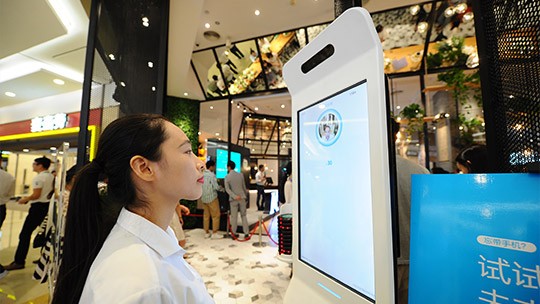
Head of Development Swisscom Outpost China
"It’s time to learn from China."
Swisscom opened a new outpost in China in 2018 in its quest for new technologies. Why? Today already, four in ten of the most valuable start-ups in the world are from China.
Sascha Bianchi, 22 September 2017, update 7 June 2018
From fishing village to China’s Silicon Valley: Shenzhen has undergone a profound transformation in recent years. The city situated opposite Hong Kong produces a billion mobile phones – annually. Shenzhen is thus the world’s mobile phone capital.
The Chinese tech boom is far from being confined to its megacities. Hangzhou is going to be China’s first cashless city. Yinchuan is pioneering the smart city. And every day, 12,000 start-ups are founded in China. So if you’re scouting for new trends, China is the place to be.

Sunrise in Shanghai: time for Tai Chi. time for Tai Chi. Time for the Swisscom outpost opened here in 2018. Picture: Keystone
Swisscom opened an outpost in Shanghai in 2018. For over a year now Yanqing Wyrsch has been flying regularly to China to supervise development personally. She visits start-ups, maintains contacts with local authorities and accompanies and assists visitors from Switzerland on their business trips to China. She acts as a cultural go-between and deciphers what is said by reading between the lines of typical Chinese messages.
Yanqing, why did Swisscom open an outpost in Shanghai?
With its 1.3 billion consumers China is perfect ground for observation and trying our new ideas. We can learn a lot here: like how digitisation affects consumers or how their behaviour changes as a result. Of course we also hope to gain many insights for our own innovative services which we can offer our customers in the future.
Does Swisscom have anything else in mind?
We want to develop strategic partnerships. And scouting for talent is another key aspect: eight million students graduate from university every year in China. We also organise visits and workshops for Swisscom employees and management in China, giving them an insight into the innovations.
China has a reputation for copying western innovations. Is this still true today?
Ten years ago, that was not entirely unfounded. But it is a very different story today. In the western media nowadays you often come across the comment:“It's time to copy China”. And they are right. People from all continents come to China to draw inspiration from Chinese innovations.

Yanqing Wyrsch visiting the Beijing start-up Mega Vision which has developed a cloud platform specialised in face recognition.
Where is innovation most prevalent?
All over really. From healthcare to banking and the entertainment industry. The Internet provides a key platform. One in four Internet users comes from China. 90 percent of the population have a mobile phone. Internet-based business models can quickly access to a huge target audience.
Who is the pioneer in this area?
Alibaba is right up front. The online trader moves more merchandise today than Amazon and eBay put together. WeChat, the app from IT giant Tencent, is also very innovative. Users can shop online, make bank transfers, buy plane or train tickets and book cinema seats with it. In the hardware sector the Chinese have also made up lost ground. Prominent examples are Lenovo and Huawei.
The Chinese government exercises a fairly strict control over business activities. Is this an obstacle to entrepreneurs and their businesses?
Yes and no. Due to the immense number of companies it isn’t possible to supervise everything in the first place. On the one hand, the government exercises a strong influence on the business community through the national development plan, regulatory policies and central control of large-scale infrastructure projects. On the other, it is currently giving companies a relatively free hand to develop and implement their ideas. There is little need to worry about excessive regulations. In addition, the government itself invests billions in start-ups and thus develops technological ecosystems.

Jack Ma, Chairman of Alibaba opens the party celebrating the 18th anniversary of the e-commerce giant in the presence of 40,000 employees at the Yellow Dragon Sports Center in Hangzhou. Picture: Keystone
What are the working conditions like in the IT industry?
In IT people still work a lot longer than someone in an office job. But things are improving. An increasing number of American and European companies are putting pressure on their Chinese suppliers to comply with labour law. The population also exerts pressure via social media. The government has passed a lot of new labour legislation to better protect employees and reduce misuse. However it could make more of its role as regulator and put more controls in place.
How does China’s digital daily life differ from Switzerland’s?
In China I pay for nearly everything with my smartphone. According to the central bank, 15 percent less paper money is printed every year. Maybe the Chinese won’t remember what RMB currency looks like in a few years’ time.

Smile to Pay: in KFC’s KPRO restaurant in Hangzhou a guest pays using face recognition instead of cash. Picture: Keystone
And how do you like living in Shanghai?
Shanghai is very cosmopolitan. I love talking to people from different countries and professions, exchanging ideas and learning from them. Of course, at the same time I miss my family and friends, the mountains and fresh air.
Face masks are the norm in China.
Yes, and air purifiers are also in high demand. Even in winter, you see lots of people wearing masks. In Peking I look up the smog report every day. In Switzerland you check the weather app; here you do the same thing with the smog app.
In 1998 Swisscom founded its first outpost in Menlo Park, Silicon Valley, aimed at monitoring the Internet hype at the time. Today ten employees scout for new technologies, business ideas and innovative methods. Another outpost in Berlin has e-commerce on its radar. In 2018 Swisscom opened its third outpost in Shanghai.